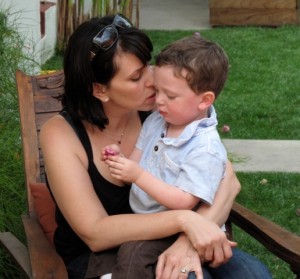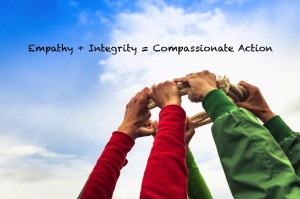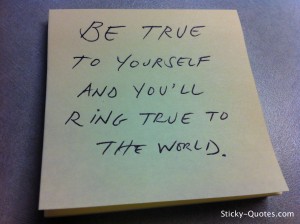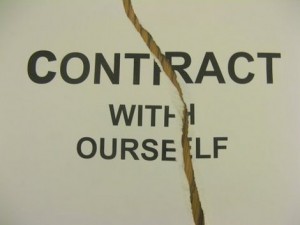 Perhaps you never gave it much thought, but empathy is a huge part of being a person of integrity. The ability to put yourself in another person’s shoes, to see and feel things from their perspective allows you to make better choices. When you can understand what it is like to be lied to, stolen from, made fun of… you are less likely to do those things to other people. That said empathy is not a trait that people are born with. Babies enter this world with just the capacity to be empathetic, but it is parents who must help them develop the actual trait.
Perhaps you never gave it much thought, but empathy is a huge part of being a person of integrity. The ability to put yourself in another person’s shoes, to see and feel things from their perspective allows you to make better choices. When you can understand what it is like to be lied to, stolen from, made fun of… you are less likely to do those things to other people. That said empathy is not a trait that people are born with. Babies enter this world with just the capacity to be empathetic, but it is parents who must help them develop the actual trait.
The number one way that children learn empathy is when they are treated with empathy. When we become empathetic parents we are showing our children that we respect them, that we are willing to see things from their side, that we value their thoughts and accept them for who they are. Basically when we walk a mile in our children’s shoes we are modeling integrity, compassion, and of course empathy.
Being an empathetic parent is not always easy. Children by nature can push our buttons. But studies show that parents who are more empathetic tend to have better relationships with their children filled with honest open communication. They also tend to be less stressed! Yes you read correctly. Empathetic parents tend to be less stressed because their children are better able to manage their own difficult emotions, can soothe themselves and get angry less often.
It’s easy to be empathetic when your child is feeling hurt, sad or afraid… but what about all those other times… especially when they are being testing and rude? This is when being empathetic is even more important. The first thing we need to do is listen, listen, and um yeah… listen. Our job is to help them to feel understood. We must learn to not take their anger or frustration personally. We need to remain calm, flexible and willing to adjust our language, thoughts, and actions. This does not mean that we are condoning negative behavior; instead we are empathizing and then affirming our belief that they will do the right thing.
When we parent our children with empathy, it puts us and our children on the same side of any problem. When we show empathy, it sends the message to our children that they are safe to make mistakes and encourages them to take responsibility when they do. When we show empathy it helps our children to think of others, to be more accepting of difference, to appreciate honesty and most of all to have the self-confidence to do the right thing even when it’s not the most popular choice. In other words, empathetic parenting helps us to raise children of integrity!


 One of the hardest concepts to teach children about integrity is having them understand the idea of being authentic and staying true to ourselves. Sure we say the old famous lines all the time. You know the ones I’m talking about. “If so and so jumped off a cliff would you?” or “Those that matter don’t mind and those that mind don’t matter.” We say these things in an effort to teach our children to be independent thinkers, to do the right thing, to stand up for what they believe in, to help them feel good about themselves. But we sometimes forget that our children learn by what they see us doing, not from the words that come out of our mouths. If we want our children to be their own unique wonderful selves 100% of the time… then we need to do the same.
One of the hardest concepts to teach children about integrity is having them understand the idea of being authentic and staying true to ourselves. Sure we say the old famous lines all the time. You know the ones I’m talking about. “If so and so jumped off a cliff would you?” or “Those that matter don’t mind and those that mind don’t matter.” We say these things in an effort to teach our children to be independent thinkers, to do the right thing, to stand up for what they believe in, to help them feel good about themselves. But we sometimes forget that our children learn by what they see us doing, not from the words that come out of our mouths. If we want our children to be their own unique wonderful selves 100% of the time… then we need to do the same.

